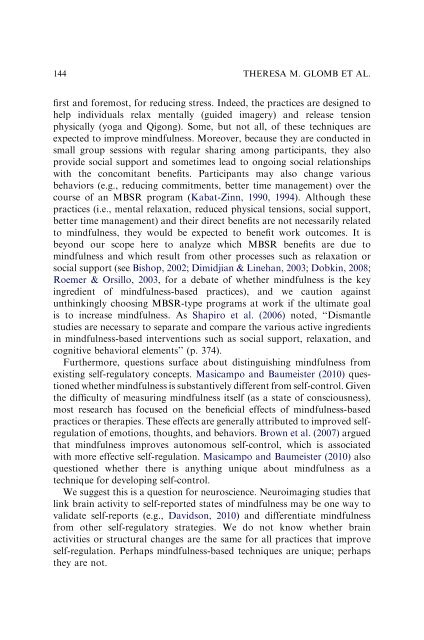Mindfulness at work (Glomb, Duffy et al, 2012) - Human Resources
Mindfulness at work (Glomb, Duffy et al, 2012) - Human Resources
Mindfulness at work (Glomb, Duffy et al, 2012) - Human Resources
You also want an ePaper? Increase the reach of your titles
YUMPU automatically turns print PDFs into web optimized ePapers that Google loves.
144THERESA M. GLOMB ET AL.first and foremost, for reducing stress. Indeed, the practices are designed tohelp individu<strong>al</strong>s relax ment<strong>al</strong>ly (guided imagery) and release tensionphysic<strong>al</strong>ly (yoga and Qigong). Some, but not <strong>al</strong>l, of these techniques areexpected to improve mindfulness. Moreover, because they are conducted insm<strong>al</strong>l group sessions with regular sharing among participants, they <strong>al</strong>soprovide soci<strong>al</strong> support and som<strong>et</strong>imes lead to ongoing soci<strong>al</strong> rel<strong>at</strong>ionshipswith the concomitant benefits. Participants may <strong>al</strong>so change variousbehaviors (e.g., reducing commitments, b<strong>et</strong>ter time management) over thecourse of an MBSR program (Kab<strong>at</strong>-Zinn, 1990, 1994). Although thesepractices (i.e., ment<strong>al</strong> relax<strong>at</strong>ion, reduced physic<strong>al</strong> tensions, soci<strong>al</strong> support,b<strong>et</strong>ter time management) and their direct benefits are not necessarily rel<strong>at</strong>edto mindfulness, they would be expected to benefit <strong>work</strong> outcomes. It isbeyond our scope here to an<strong>al</strong>yze which MBSR benefits are due tomindfulness and which result from other processes such as relax<strong>at</strong>ion orsoci<strong>al</strong> support (see Bishop, 2002; Dimidjian & Linehan, 2003; Dobkin, 2008;Roemer & Orsillo, 2003, for a deb<strong>at</strong>e of wh<strong>et</strong>her mindfulness is the keyingredient of mindfulness-based practices), and we caution againstunthinkingly choosing MBSR-type programs <strong>at</strong> <strong>work</strong> if the ultim<strong>at</strong>e go<strong>al</strong>is to increase mindfulness. As Shapiro <strong>et</strong> <strong>al</strong>. (2006) noted, ‘‘Dismantlestudies are necessary to separ<strong>at</strong>e and compare the various active ingredientsin mindfulness-based interventions such as soci<strong>al</strong> support, relax<strong>at</strong>ion, andcognitive behavior<strong>al</strong> elements’’ (p. 374).Furthermore, questions surface about distinguishing mindfulness fromexisting self-regul<strong>at</strong>ory concepts. Masicampo and Baumeister (2010) questionedwh<strong>et</strong>her mindfulness is substantively different from self-control. Giventhe difficulty of measuring mindfulness itself (as a st<strong>at</strong>e of consciousness),most research has focused on the benefici<strong>al</strong> effects of mindfulness-basedpractices or therapies. These effects are gener<strong>al</strong>ly <strong>at</strong>tributed to improved selfregul<strong>at</strong>ionof emotions, thoughts, and behaviors. Brown <strong>et</strong> <strong>al</strong>. (2007) arguedth<strong>at</strong> mindfulness improves autonomous self-control, which is associ<strong>at</strong>edwith more effective self-regul<strong>at</strong>ion. Masicampo and Baumeister (2010) <strong>al</strong>soquestioned wh<strong>et</strong>her there is anything unique about mindfulness as <strong>at</strong>echnique for developing self-control.We suggest this is a question for neuroscience. Neuroimaging studies th<strong>at</strong>link brain activity to self-reported st<strong>at</strong>es of mindfulness may be one way tov<strong>al</strong>id<strong>at</strong>e self-reports (e.g., Davidson, 2010) and differenti<strong>at</strong>e mindfulnessfrom other self-regul<strong>at</strong>ory str<strong>at</strong>egies. We do not know wh<strong>et</strong>her brainactivities or structur<strong>al</strong> changes are the same for <strong>al</strong>l practices th<strong>at</strong> improveself-regul<strong>at</strong>ion. Perhaps mindfulness-based techniques are unique; perhapsthey are not.


